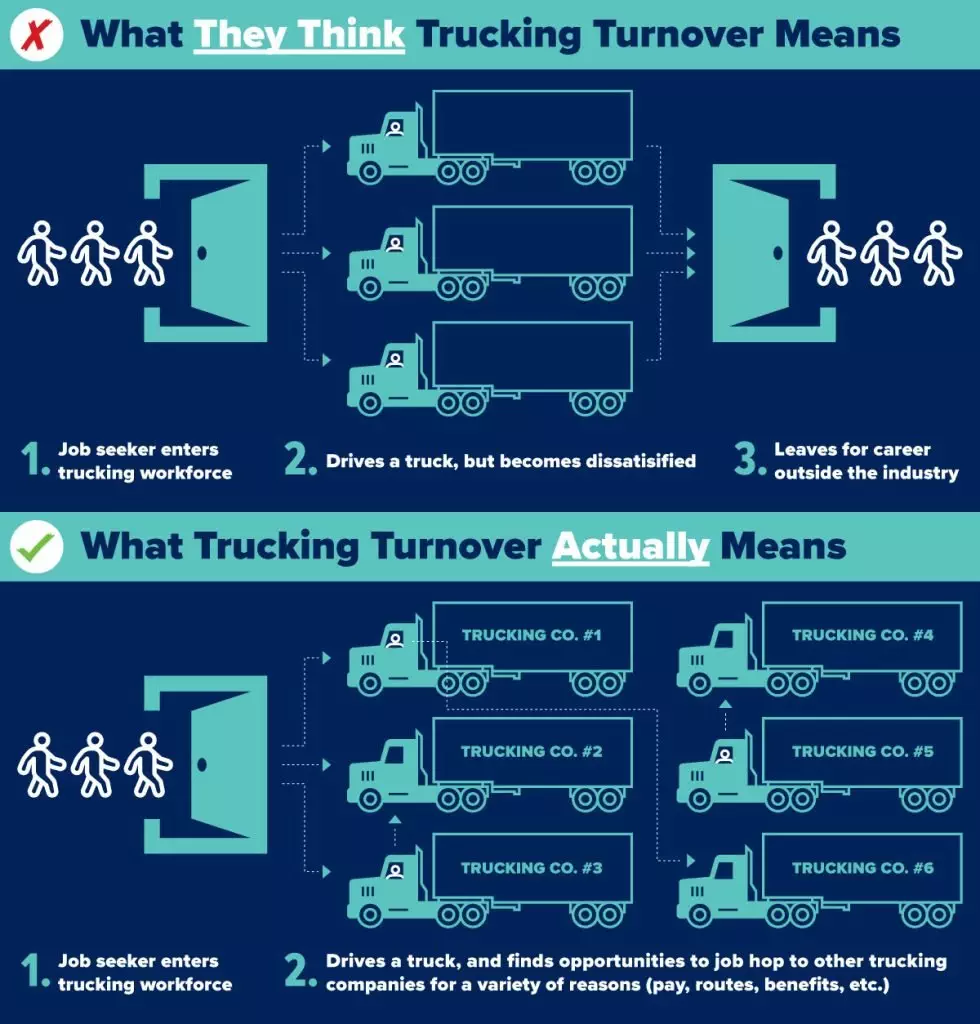It’s no secret that the trucking industry is experiencing a significant decline in the number of truckers. But what exactly is causing this exodus from a profession that used to be considered stable and lucrative? In this article, we explore some of the key factors behind why truckers are leaving the industry, shedding light on the evolving challenges they face and the potential implications for the transportation sector as a whole.

This image is property of www.trucking.org.
1. Long Hours and Demanding Schedule
1.1 Lack of Work-Life Balance
One of the main reasons why truckers are leaving the industry is the lack of work-life balance. Truckers often have to spend long hours on the road, away from their families and loved ones. This constant separation from their personal lives can take a toll on their mental and emotional well-being. It becomes increasingly challenging to maintain relationships and participate in family events when you’re constantly on the move.
1.2 Health and Fatigue Issues
Truckers face significant health and fatigue issues due to their demanding schedules. Irregular sleeping patterns, long hours of sitting, and lack of access to nutritious food can lead to various health problems such as obesity, diabetes, and heart disease. The nature of their work often leaves little time for exercise or self-care, further exacerbating these issues. Additionally, fatigue resulting from long hours of driving can lead to a higher risk of accidents and injuries.
1.3 High Stress Levels
The trucking industry can be highly stressful, and this is another significant factor contributing to the exodus of truckers. Meeting tight deadlines, navigating through traffic, and dealing with unforeseen road conditions can be incredibly stressful. Moreover, the pressure to deliver goods on time and the fear of potential delays or accidents can create an immense amount of stress. This constant stress can take a toll on truckers’ mental health, leading to burnout and a decreased quality of life.
2. Low Pay and Financial Challenges
2.1 Decreasing Earnings Potential
Truckers often face decreasing earnings potential due to various factors such as increasing competition, rising fuel costs, and fluctuating demand for goods. Despite their long hours and hard work, the wages for truckers have not kept up with the rising cost of living. This makes it challenging for them to make ends meet and support themselves and their families. The lack of adequate financial compensation and the inability to secure a stable income have become major deterrents for those considering a career in trucking.
2.2 Rising Costs of Maintenance and Fuel
Truckers are also burdened with the rising costs of maintenance and fuel, which significantly impact their take-home pay. The cost of maintaining a truck, including regular servicing, repairs, and insurance, has been steadily increasing over the years. Additionally, the unpredictable fluctuations in fuel prices can have a significant impact on their earnings. These financial challenges, coupled with low wages, make it difficult for truckers to sustain a decent quality of life and meet their financial obligations.
2.3 Uncertain Economic Conditions
The trucking industry is highly dependent on the overall state of the economy. During times of economic downturn, demand for transportation services decreases, resulting in fewer job opportunities and reduced earnings for truckers. The uncertainty of economic conditions and the cyclical nature of the industry create a sense of instability and financial insecurity among truckers. This uncertainty further pushes them to explore alternative career options with more stable income prospects.
3. Lack of Career Advancement Opportunities
3.1 Limited Growth and Promotion Potential
For many truckers, the lack of career advancement opportunities is a significant frustration. The trucking industry often does not provide clear pathways for growth and promotion. Truckers may feel trapped in their current positions without any prospects for professional development or advancement. This lack of upward mobility can lead to a sense of stagnation and dissatisfaction, prompting them to seek other career options that offer better prospects for personal and professional growth.
3.2 Monotonous and Repetitive Nature of the Job
Trucking can be a monotonous and repetitive job, which can lead to a lack of fulfillment and job satisfaction over time. The long hours spent on the road, driving alone for extended periods, can become mentally and emotionally draining. The repetitive nature of the job can make it feel like a never-ending cycle of similar tasks, which may not be appealing for individuals seeking variety and new challenges in their careers. The desire for more stimulating and engaging work can drive truckers to explore other industries that offer a wider range of experiences.
4. Technological Advancements and Automation
4.1 Fear of Job Replacement
One of the concerns faced by truckers is the fear of job replacement due to technological advancements and automation in the industry. The rapid evolution of self-driving vehicles and the integration of advanced technologies in transportation have raised concerns about the future of trucking jobs. As automation continues to advance, there is a growing apprehension among truckers that their jobs may become obsolete in the near future. This fear acts as a deterrent for those considering a long-term career in the industry.
4.2 Difficulty in Adapting to New Technologies
Another factor contributing to truckers leaving the industry is the difficulty in adapting to new technologies. The trucking industry is increasingly relying on advanced GPS systems, electronic logging devices, and other technological tools to streamline operations and improve efficiency. However, not all truckers feel comfortable or equipped to navigate these new technologies. The rapid pace of technological advancements can make it challenging for some truckers, especially those who have been in the industry for a long time, to keep up with the changing landscape. This technological divide adds to the feeling of job insecurity and can drive truckers to seek alternative careers.

This image is property of walton.uark.edu.
5. Tough Working Conditions and Challenging Environment
5.1 Loneliness and Isolation
Truckers often experience feelings of loneliness and isolation due to the nature of their work. Spending long hours driving alone can be emotionally challenging, especially for individuals who thrive on social interaction and human connection. The lack of companionship and the isolation experienced on the road can lead to feelings of loneliness and mental distress.
5.2 Unsafe and Unhealthy Road Conditions
Truckers face various safety hazards and health risks while on the road. They often have to navigate through unpredictable road conditions, adverse weather, and heavy traffic. The stress and pressure of maneuvering large vehicles in challenging situations can lead to accidents, injuries, and even fatalities. Moreover, the sedentary nature of the job coupled with limited access to nutritious food and exercise options further contributes to truckers’ overall health and well-being.
5.3 Unpredictable Weather Challenges
Truckers are exposed to the unpredictable and sometimes extreme weather conditions during their journeys. From heavy rain and snowstorms to scorching heatwaves, they have to navigate through various weather challenges. These hazardous conditions not only pose a threat to their personal safety but also impact the efficient and timely delivery of goods. The constant battle with adverse weather conditions can be physically and mentally exhausting for truckers, adding to their overall dissatisfaction with the job.
6. High Entry Barriers and Regulations
6.1 Costly Training and Licensing Requirements
Becoming a trucker involves costly training and licensing requirements. Prospective truckers need to complete a commercial driver’s license (CDL) program, which can be both financially and time-consuming. The cost of obtaining a CDL, coupled with the expenses associated with training programs and required endorsements, can be a significant barrier for individuals interested in pursuing a career in the industry. These high entry barriers discourage potential truckers and contribute to the shortage of drivers in the industry.
6.2 Stringent Safety and Compliance Standards
Truckers are subject to strict safety and compliance standards imposed by regulatory bodies. These standards are essential to ensure public safety and maintain the integrity of the transportation industry. However, complying with these regulations can be burdensome for truckers. From maintaining accurate logbooks to regular vehicle inspections, truckers need to adhere to a plethora of rules and regulations. The pressure to meet these standards can be overwhelming, especially for those who are unfamiliar with the complexities of the industry. The stringent requirements sometimes act as a deterrent for individuals considering a career as a trucker.
This image is property of i.insider.com.
7. Aging Workforce
7.1 Retirement and Lack of Younger Workers
The trucking industry is currently facing an aging workforce, and retirement is a significant concern. As older truckers retire, there is a lack of younger workers entering the industry to replace them. This gap in the generational workforce poses a challenge to the sustainability of the industry. The lack of young talent entering the trucking profession can be attributed to various factors discussed earlier, such as low pay, long hours, tough working conditions, and the negative perception surrounding the industry.
8. Job Insecurity and Instability
8.1 Contractual Employment and Lack of Benefits
Truckers often face job insecurity and instability due to the prevalence of contractual employment and lack of benefits. Many truckers work as independent contractors, which means they have limited job security and little to no access to benefits such as health insurance, retirement plans, and paid time off. The uncertainty of future work opportunities, coupled with the lack of financial stability and employee benefits, pushes truckers to seek more secure employment options with better benefits.
8.2 Economic Downturns and Industry Volatility
The trucking industry is highly susceptible to economic downturns and industry volatility. During times of economic recession, the demand for transportation services decreases, leading to a decline in job opportunities and earnings for truckers. The cyclical nature of the industry, coupled with the unpredictability of economic conditions, creates a sense of instability and financial insecurity. Truckers face the constant risk of layoffs and reduced income, making it difficult for them to commit to a long-term career in the industry.

This image is property of cdn2.hubspot.net.
9. Disruptions in Supply Chain and Trade
9.1 Changes in Global Trade Policies
Changes in global trade policies can have a significant impact on the trucking industry. Tariffs, trade disputes, and shifts in trade agreements can disrupt the smooth flow of goods and negatively affect the demand for transportation services. Truckers bear the brunt of these disruptions as they may experience a decrease in job opportunities and reduced earnings. The uncertainty surrounding trade policies and the potential impact on the industry can deter individuals from pursuing a career as a trucker.
9.2 Impact of Pandemics and Natural Disasters
Pandemics and natural disasters can also disrupt the supply chain and impact the trucking industry. During periods of crisis, such as the COVID-19 pandemic, truckers may face challenges in delivering goods due to travel restrictions, supply chain disruptions, and reduced demand for non-essential items. Natural disasters like hurricanes, floods, or wildfires can damage infrastructure and impede the transportation of goods. The vulnerability of the trucking industry to such events can discourage individuals from entering or staying in the profession.
10. Negative Public Perception and Stigma
10.1 Lack of Appreciation and Respect
Truckers often feel a lack of appreciation and respect from the general public. While they play a crucial role in ensuring the delivery of goods that fuel the economy, their profession is often overlooked or misunderstood. Truckers face stereotypes and misconceptions that paint them in a negative light. The lack of acknowledgment and respect can be demoralizing and contribute to job dissatisfaction, ultimately leading to an exodus from the industry.
10.2 Stereotyping and Misconceptions about Truckers
Stereotyping and misconceptions about truckers are prevalent in society. They are often portrayed as reckless drivers, uneducated individuals, or even as a threat to safety on the road. These stereotypes overlook the hard work, skill, and dedication required to be a professional truck driver. The perpetuation of these misconceptions can deter individuals from considering a career as a trucker and can also negatively impact the self-esteem and job satisfaction of those already in the profession.
In conclusion, truckers are leaving the industry due to a multitude of factors ranging from long hours and demanding schedules to low pay, lack of career advancement opportunities, and fear of job replacement due to technological advancements. Tough working conditions, high entry barriers, job insecurity, disruptions in the supply chain, negative public perception, and the aging workforce are additional contributing factors. Addressing these challenges and implementing measures to improve the trucking industry can help retain and attract talent, ensuring a sustainable future for this vital profession.
This image is property of i.insider.com.



